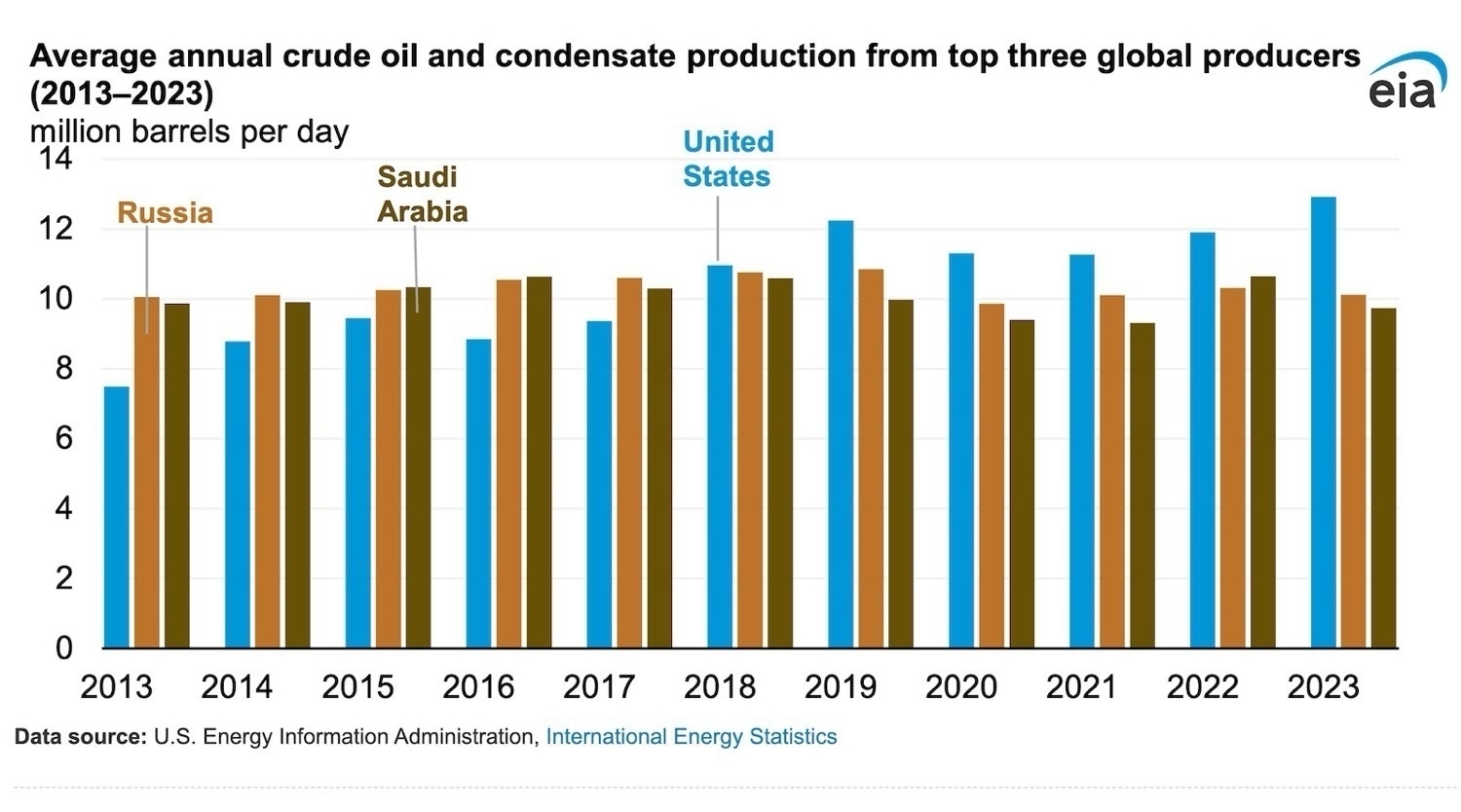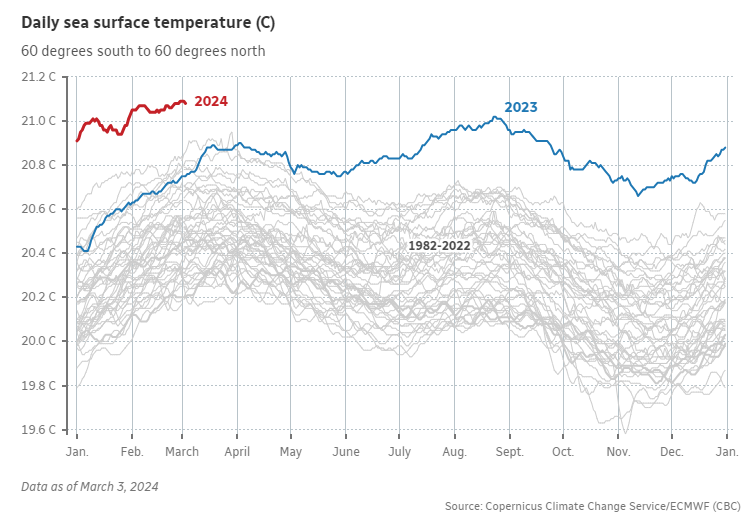Climate Emergency
Schools close and crops wither as ‘historic’ heatwave hits south-east Asia | The Guardian
Thousands of schools in the Philippines have stopped in-person classes due to unbearable heat. In Indonesia, prolonged dry weather has caused rice prices to soar. In Thailand’s waters, temperatures are so high that scientists fear coral could be destroyed.
A “historic heatwave” is being experienced across south-east Asia, according to Maximiliano Herrera, a climatologist and weather historian.
The case for paying ranchers to raise trees instead of cattle | The Guardian
There is a simple, cost-effective and scientifically sound way to turn back the clock on global warming and reverse the catastrophic collapse of biodiversity: pay ranchers to raise trees instead of cattle.
By mass, the world’s 1.7 billion cows are the dominant animal species on Earth, far outweighing the human population, and outweighing all the wild terrestrial mammals, birds, reptiles and amphibians left on Earth by more than 15-fold. More than a third of Earth’s land is used to feed livestock.
Big surprise.
Nations Are Undercounting Emissions, Putting UN Goals at Risk - Yale E360
Because of lax rules, national inventories reported to the United Nations grossly underestimate many countries’ greenhouse gas emissions…
In the United States, an analysis published this month of the air over the country’s oil and natural gas fields found that they emit three times more methane — a gas responsible for a third of current warming — than the government has reported.
Not only will the cost of food contiune to rise, but an increasingly destabilized climate will decrease crop production as the population of the planet grows. We will have food shortages. The poorest of the planet will suffer first. And the wealthiest 10% are okay with that.
Extreme Heat Is Driving Up Food Prices — and It’s Only Going to Get Worse | Truthout
Food prices have climbed 25 percent over the past four years, and Americans have been shocked…
We’ve been warned, we sholudn’t be shocked.
In the US we’re just beginning to pay the price for what we’ve done. The wealthiest class in the top 10% on the planet (most in the US are in this group), are now feeling just a hint of the pain that is to come. The insurance crisis will bleed out into other economic crises. And we in western nations have not yet begun to experience the food shortages that will come soon enough as the climate emergency creates instability in the agricultural systems of the world.
The home insurance market is crumbling. These owners are paying the price | CNN Business
But as climate change increases the frequency and severity of extreme weather, insurers — especially those in areas most impacted by floods and fires — are raising their premiums, or pulling out altogether, impacting the affordability and availability of home and fire insurance.
Herrera shopped around for a new plan, but he struggled to find a policy. Louisiana Citizens, the insurer of last resort for property owners in the state, was out of the question. It would have cost more than $7,000 annually…
“It’s a very difficult situation,” he said. He never imagined that when he bought his home, private insurance options would be this limited and the last resort insurer would be so expensive…
He never imagined because he, like most in the US, wasn’t paying fucking attention. Climate scientists and activists have been warning for at least two decades that this day would come.
Herrera’s insurance story is common in Louisiana and other places across the country at increasingly higher risk for extreme weather.
There were a record 28 weather and climate disasters with losses totaling over $1 billion last year in America, according to the National Oceanic and Atmospheric Administration. By comparison, between 1980 and 2023, the typical annual average for these events was 8.5.
Just getting started.
Extreme heat could trigger the worst global financial crisis ever seen | New Scientist
Without dramatic action to curb greenhouse emissions, even high-latitude countries with cooler climates will suffer devastating, if indirect, financial losses as extreme heat disrupts global supply chains. The result could be the worst financial crisis the world has ever seen.
It is already well known that severe heatwaves have numerous health and economic impacts, including higher mortality rates, preventing people from working outside, destroying crops and disrupting industrial processes.
Study documents slowing of Atlantic currents
While scientists have observed oceans heating up for decades and theorized that their rising temperatures weaken global currents, a new study led by a University of Maryland researcher documents for the first time a significant slowing of a crucial ocean current system that plays a role in regulating Earth’s climate.
Around the world, climate change is impacting the way we live. In the U.S., the housing crisis is being pushed to the brink as insurers struggle to cover homes impacted by natural disasters. Bloomberg reporter Leslie Kaufman joins Hari Sreenivasan to discuss her recent reporting on this very issue.
With no progress to reduce driving or flying it would seem most Americans agree. Americans love their trucks and cars. Their children? Not so much.
World’s top fossil-fuel bosses deride efforts to move away from oil and gas | The Guardian
“We should abandon the fantasy of phasing out oil and gas, and instead invest in them adequately,” said Amin Nasser, chief executive of Saudi Aramco, the world’s largest oil company, to applause in the room.
Climate researcher on what’s causing the record rise in ocean temperatures - YouTube
The World Meteorological Organization issued a red alert warning Tuesday about warming and climate change, saying 2024 is shaping up to be another record year. One of the many worries about how the planet is changing, thanks in part to human activity, is the record-shattering warming of the world’s oceans.
The US transition to Green Energy is going well.
United States Produces More Crude Oil Than Any Country, Ever - CleanTechnica

The United States produced more crude oil than any nation at any time, according to our International Energy Statistics, for the past six years in a row. Crude oil production in the United States, including condensate, averaged 12.9 million barrels per day (b/d) in 2023, breaking the previous U.S. and global record of 12.3 million b/d, set in 2019.
Heartbreaking and predictable. Also, the response is an irrational, stubborn denial of reality. And yes, of course it’s climate change. And it’s people and capitalism that are to blame.
This Louisiana town lost 90% of its population. Is climate change to blame?
A series of hurricanes have devastated the area… This summer is expected to be a particularly volatile hurricane season. Rising sea surface temperatures arising from global warming are making hurricanes strengthen faster than ever before…
So good.
An Honest Chevron Ad - YouTube
Did you know Chevron was found liable for $9.5 billion in damages from decades of dumping toxic oil waste in the Amazon basin? And instead of paying, they spent years persecuting and stripping the rights of Steven Donziger, the lawyer who led the case against them.
The climate emergency is just getting started.
Homeowners Are Losing Their Insurance
Homeowners insurance costs have soared across the country partly due to unpredictable weather patterns, particularly in places like California, Texas and Florida, a development that has led to increased claims from customers that are hurting companies…
“Climate adaptation, on the other hand, will become very real, as more insurers scale back activities in even more regions affected by climate change and explore new types of heat-linked policies,” she said.
People living this close to the ocean are still in denial of what’s coming. They spent $500,000 on a sand dune wiped away in 3 days.
Massachusetts town grapples with sea rise after sand barrier fails…
As weather patterns get more extreme and oceans get warmer, sea levels rise due to thermal expansion and weather patterns get more extreme, boosting coastal erosion. This climate crisis is now on the doorstep of Salisbury beach homeowners, as they suffer the consequences of rising sea levels, stronger winds and severe storms in recent months, including two in January.
Climate activists across Europe block access to North Sea oil infrastructure | The Guardian
Climate activists in four countries are blocking access to North Sea oil infrastructure as part of a coordinated pan-European civil disobedience protest….
The protest comes in the same week a report found none of the big fossil fuel producing countries in the region had plans to stop drilling soon enough to meet the 1.5C (2.7F) global heating target set by the Paris climate accords.
Human-caused climate change fuels hottest February on record, all-time high ocean warming | CBC News

For the ninth straight month, Earth has obliterated global heat records — with February, the winter as a whole and the world’s oceans setting new high-temperature marks, according to the European Union climate agency Copernicus.
The latest record-breaking in this climate change-fuelled global hot streak includes sea surface temperatures that weren’t just the hottest for February, but eclipsed any month on record, soaring past August 2023’s mark and still rising at the end of the month.
Moving in the wrong direction on climate.
Amid explosive demand, America is running out of power - The Washington Post…
Vast swaths of the United States are at risk of running short of power as electricity-hungry data centers and clean-technology factories proliferate around the country, leaving utilities and regulators grasping for credible plans to expand the nation’s creaking power grid.
Linked: Climate Emergency
This chart of ocean temperatures should really scare you…
If you were to dip your toes into the middle of the North Atlantic — say, somewhere between South Carolina and Spain — the water would feel frigid. You definitely wouldn’t want to swim. It’s winter.
Yet that water would, in fact, be very warm, relatively speaking. Right now, the North Atlantic ocean is, on average, warmer than any other time on record, running about 2 degrees Fahrenheit hotter than the average temperature over the last three decades.
The Smokehouse Creek Fire, now the largest in Texas history at 1 million acres, 2,000 square miles. The same amount of land as the state of Delaware. And it’s still burning.
Do the people of Texas support taking personal and legislative action to address the climate emergency?
They should.